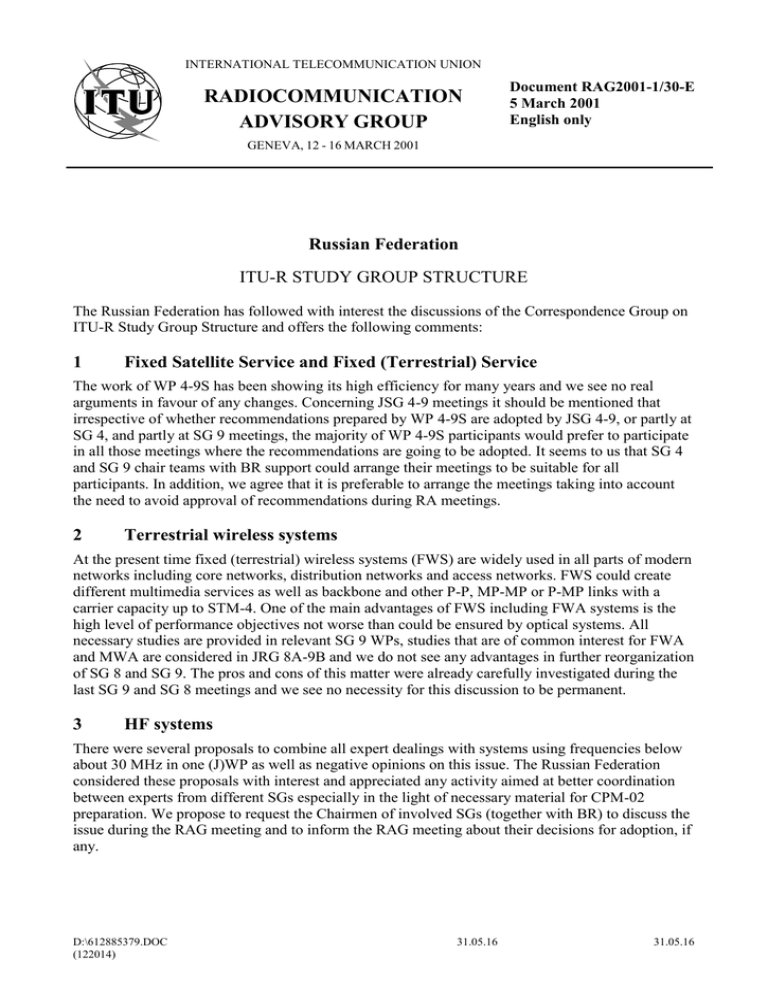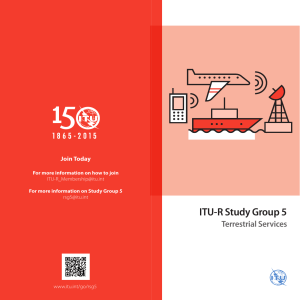RADIOCOMMUNICATION ADVISORY GROUP
advertisement

INTERNATIONAL TELECOMMUNICATION UNION RADIOCOMMUNICATION ADVISORY GROUP Document RAG2001-1/30-E 5 March 2001 English only GENEVA, 12 - 16 MARCH 2001 Russian Federation ITU-R STUDY GROUP STRUCTURE The Russian Federation has followed with interest the discussions of the Correspondence Group on ITU-R Study Group Structure and offers the following comments: 1 Fixed Satellite Service and Fixed (Terrestrial) Service The work of WP 4-9S has been showing its high efficiency for many years and we see no real arguments in favour of any changes. Concerning JSG 4-9 meetings it should be mentioned that irrespective of whether recommendations prepared by WP 4-9S are adopted by JSG 4-9, or partly at SG 4, and partly at SG 9 meetings, the majority of WP 4-9S participants would prefer to participate in all those meetings where the recommendations are going to be adopted. It seems to us that SG 4 and SG 9 chair teams with BR support could arrange their meetings to be suitable for all participants. In addition, we agree that it is preferable to arrange the meetings taking into account the need to avoid approval of recommendations during RA meetings. 2 Terrestrial wireless systems At the present time fixed (terrestrial) wireless systems (FWS) are widely used in all parts of modern networks including core networks, distribution networks and access networks. FWS could create different multimedia services as well as backbone and other P-P, MP-MP or P-MP links with a carrier capacity up to STM-4. One of the main advantages of FWS including FWA systems is the high level of performance objectives not worse than could be ensured by optical systems. All necessary studies are provided in relevant SG 9 WPs, studies that are of common interest for FWA and MWA are considered in JRG 8A-9B and we do not see any advantages in further reorganization of SG 8 and SG 9. The pros and cons of this matter were already carefully investigated during the last SG 9 and SG 8 meetings and we see no necessity for this discussion to be permanent. 3 HF systems There were several proposals to combine all expert dealings with systems using frequencies below about 30 MHz in one (J)WP as well as negative opinions on this issue. The Russian Federation considered these proposals with interest and appreciated any activity aimed at better coordination between experts from different SGs especially in the light of necessary material for CPM-02 preparation. We propose to request the Chairmen of involved SGs (together with BR) to discuss the issue during the RAG meeting and to inform the RAG meeting about their decisions for adoption, if any. D:\612885379.DOC (122014) 31.05.16 31.05.16 -2RAG2001-1/30-E 4 General principles of restructuring Considering in general the role of the ITU-R study groups the Russian Federation agrees with the conclusion of many inputs where the use of the existing SGs/WPs/TGs as much as possible was emphasized. Restructuring should not be an end in itself. Of course, ITU-R as well as ITU in general should follow major modern communications trends but it seems useful to carefully consider actual advantages and disadvantages (including the additional time and budget needed for the discussion itself) when any reconstruction is proposed. For the time being the Russian Federation does not see any strong arguments for ITU-R restructuring. 5 Suggestions regarding working methods, particularly electronic working methods Increased use of electronic working methods should be encouraged taking into account the necessity of clear understanding on whom and what administration or organization authors of e-mail messages represent. Some working methods which are widely used by ITU-T including the access to temporary documents could be used by ITU-R as well. Concerning the possibility to speed up the recommendation approval process by correspondence under Resolution ITU-R 1-3 (item 10.3), based on experience, it could be proposed to shorten the period for approval by correspondence from 3 months to 1 month, because all necessary amendments, if any, should already be agreed at a previous stage (adoption by correspondence). Otherwise the recommendation has to be returned to the study group for review. _______________ D:\612885379.DOC (122014) 31.05.16 31.05.16

